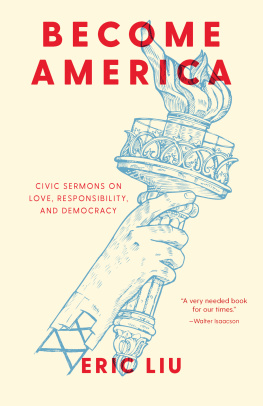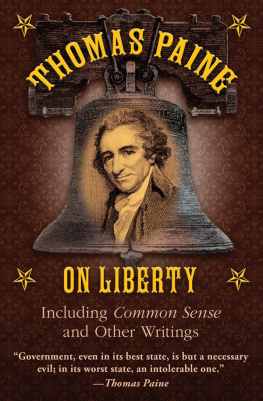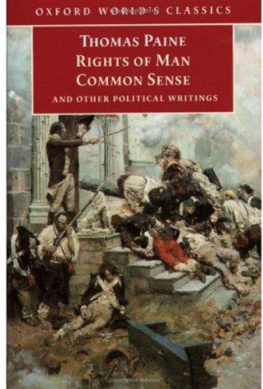Copyright 2007 by Eric Liu and Nick Hanauer
All rights reserved. No portion of this book may be reproduced or utilized in any form, or by any electronic, mechanical, or other means, without the prior written permission of the publisher.
Published by Sasquatch Books
Paperback edition, Sasquatch Books, 2009
Hardcover edition, Sasquatch Books, 2007
Original hardcover edition published by True Patriot Network, 2007
Library of Congress Cataloging-in-Publication Data is available.
eISBN: 978-1-57061-870-3
Sasquatch Books
1904 Third Avenue, Suite 710
Seattle, WA 98101
(206) 467-4300
www.sasquatchbooks.com
v3.1

CONTENTS
Patriotic Values and Policies:
A Ten-Principle Plan
I CONFIDENTLY trust that the American people will prove themselves too wise not to detect the false pride or the dangerous ambitions or the selfish schemes which so often hide themselves under that deceptive cry of mock patriotism: Our country, right or wrong! They will not fail to recognize that our dignity, our free institutions and the peace and welfare of this and coming generations of Americans will be secure only as we cling to the watchword of true patriotism: Our countrywhen right to be kept right; when wrong to be put right.
SENATOR CARL SCHURZ, CHICAGO, ILLINOIS, OCTOBER 17, 1899
A Politics
of Purpose
THE IDEAS CONTAINED IN THIS VOLUME are a consequence of frustrationthe frustration that two Americans felt with our nations political culture at the beginning of the 21st century. We are both the sons of immigrants, and both have benefited enormously from the opportunities that America makes possible. We are the American dream and we are immeasurably grateful.
But in recent years, weve become despondent over the way politics plays out in our extraordinary country. We are still sickened at how the moment after September 11 was squandered: a moment when the world was with us, utterly, and when all Americans were yearning to be part of something greater than ourselves. We abhor the way political conversation has, ever since, settled back into a predictable pattern of cheap polarization, staged conflicts and false choices. We reject the idea that politics is about the promotion of ones narrow self-interest, and the underlying myth that millions of little acts of selfishness add up somehow to a healthy community. We believe that in these cynical timesespecially in these timesthere should be a higher call to country first.
Readers should know that we are progressive and Democrats. But while we are appalled by much of what we hear from the right wing of the Republican Party, we freely admit that conservatives have been correct about certain ideas: the need to tie reward to work, and punishment to crime; the importance of drawing lines between right and wrong; the dangers of a no consequences culture.
We also believe that for too long, the Democratic Party has lacked a compelling story that can capture the moral and political imagination of most Americans. Too many of our progressive friends are content either to carp from the sidelines, to wait for Republican acts of self-destruction, or to play tactical word games that position progressive stances palatably while failing to articulate an overarching vision of the original purposes of politics and policy. We are particularly frustrated that so much of our politics today consists of lines first written during the clashes, domestic and foreign, of the 1960s. This Groundhog Day approach to replaying the culture wars tropes is perhaps nowhere in greater evidence than in how Americans talk about patriotism.
Patriotism, as an idea, has been co-opted over the course of a generation by right-wingers who use the flag not as a symbol of transcendent national unity, but as a sectarian cudgel against the hippies, Francophiles, free-lovers and tree-huggers who constitute their caricature of the American left. The American left, for its part, has been so beaten down by this star-spangled caricature that it has largely ceded the very notion of patriotism to the right. As a result, the first reaction of far too many progressives to any talk of patriotism is automatic, allergic recoil. Needless to say, this reaction simply tightens the screws of the rights imprisoning caricature.
In these pages we offer an alternative.
Both of us operate in our daily lives from the precept that if you dont like something then you must either offer an alternative or shut up. We realized to our dismay that as much as we disliked what others said in politics, we had little better to offer. As dissatisfied as we were with conservative and liberal answers to the question What do you really believe, and why?, we had no good answer of our own. This document, then, written in the spirit of Thomas Paines Common Sense and the other American pamphlets of the founders era, is our answer to that self-imposed question.
Our aim was to answer this question in moral terms, not to offer a list of issue positions. We believe all politics is fundamentally about morality: What rules do we need to live a good life together? How should those rules govern the choices we make not only as individuals but as a community? The needs that politics must meet are not merely material. A winning and worthy politicsa politics of purposeshould address wants, fears and yearnings that are about the most primordial choices humans makeand it should tip the scales in every choice from selfishness toward social good.
Today, however, progressive politics is replete with leaders who, in the best case, enumerate the policies they like or dont like, while revealing little about their deeper moral choice-making. This lets us know how these leaders might vote, but not who they are. And while highly engaged and sophisticated voters may be able to reverse engineer a moral system from policy positions, the vast majority of voters dont, wont or cant. Thats why it is essential that progressive leaders learn anew how to speak in moral terms. Because only by letting us know who they truly are can they earn our lasting support.
We were cheered by the 2006 elections, in which Democrats won and Republicans lost. But we do not kid ourselves: that election was a negative referendum on a failed administration. In order to lead with a true mandate, and to earn enduring and affirmative public trust, progressives have to articulate a coherent moral framework that is compelling to most Americans and within which policy positions fit.
That is the method of this pamphlet. The reader will notice that this is not a long document. In fact, the essence of it can be contained in just a few pages, the moral code that follows this introduction. It was far harder to distill and succinctly state what we believed than we thought it would be. Getting that down to a page took months. If this surprises you, we encourage you to try it yourself.
Our values and beliefs were not poll-tested, so we do not know if they represent the views of more than two Americans. But an enormous amount of research went into helping us define and characterize our ideas. We immersed ourselves, through readings and interviews, in philosophy, politics, linguistics, religion, demographics and history. We talked to professors, preachers and politicians. We listened to many ordinary Americans. We carefully read and analyzed the writings and speeches of the Americans we admired most and through that tried to understand and connect with the deepest traditions and narrative of American life.













